Principles of Health and Social Care Practice Report - Semester 1
VerifiedAdded on 2023/04/20
|13
|3252
|288
Report
AI Summary
This report examines the core principles of health and social care practice, focusing on the application of support principles to ensure individual well-being, the implementation of safeguarding procedures for vulnerable adults, and the benefits of person-centered approaches in service delivery. It explores ethical dilemmas that arise in providing care to individuals with complex needs and analyzes a chosen code of conduct, evaluating its impact on organizational policies and national legislation. The report also outlines the author's roles and responsibilities within a health and social care workplace, including contributions to policy development, and offers recommendations to meet new practice requirements. The report emphasizes the importance of accountability, patient confidentiality, and continuous professional development within the health and social care sector.
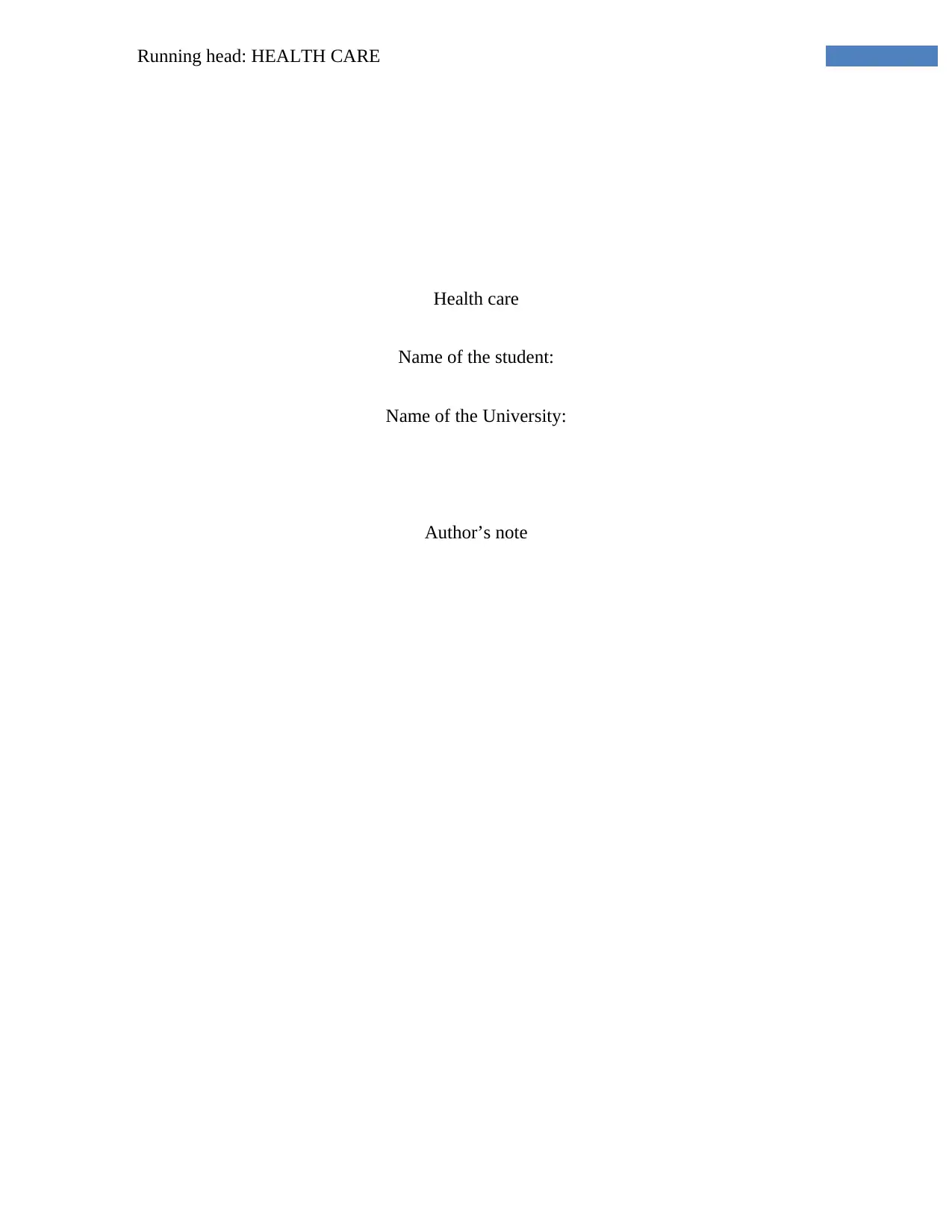
Running head: HEALTH CARE
Health care
Name of the student:
Name of the University:
Author’s note
Health care
Name of the student:
Name of the University:
Author’s note
Paraphrase This Document
Need a fresh take? Get an instant paraphrase of this document with our AI Paraphraser
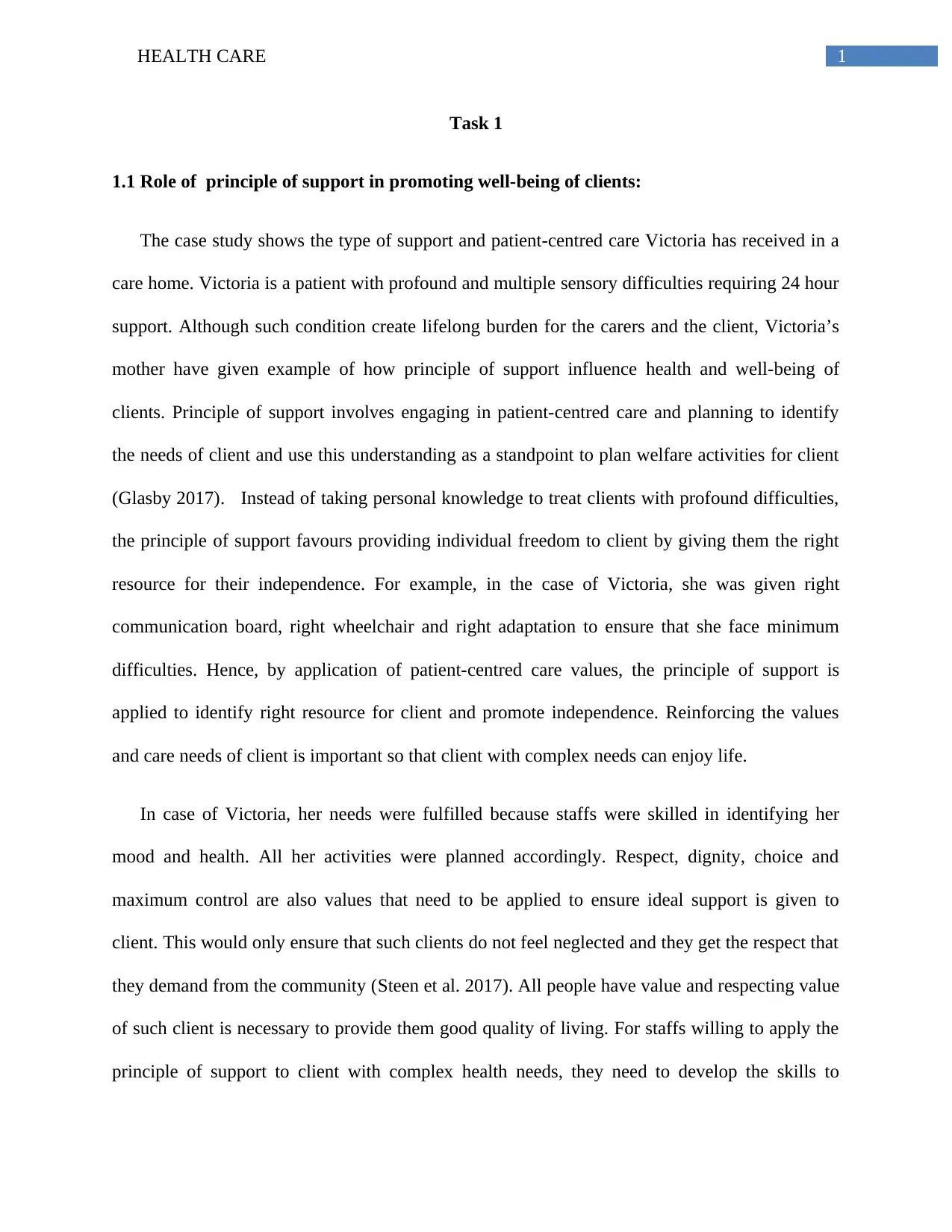
1HEALTH CARE
Task 1
1.1 Role of principle of support in promoting well-being of clients:
The case study shows the type of support and patient-centred care Victoria has received in a
care home. Victoria is a patient with profound and multiple sensory difficulties requiring 24 hour
support. Although such condition create lifelong burden for the carers and the client, Victoria’s
mother have given example of how principle of support influence health and well-being of
clients. Principle of support involves engaging in patient-centred care and planning to identify
the needs of client and use this understanding as a standpoint to plan welfare activities for client
(Glasby 2017). Instead of taking personal knowledge to treat clients with profound difficulties,
the principle of support favours providing individual freedom to client by giving them the right
resource for their independence. For example, in the case of Victoria, she was given right
communication board, right wheelchair and right adaptation to ensure that she face minimum
difficulties. Hence, by application of patient-centred care values, the principle of support is
applied to identify right resource for client and promote independence. Reinforcing the values
and care needs of client is important so that client with complex needs can enjoy life.
In case of Victoria, her needs were fulfilled because staffs were skilled in identifying her
mood and health. All her activities were planned accordingly. Respect, dignity, choice and
maximum control are also values that need to be applied to ensure ideal support is given to
client. This would only ensure that such clients do not feel neglected and they get the respect that
they demand from the community (Steen et al. 2017). All people have value and respecting value
of such client is necessary to provide them good quality of living. For staffs willing to apply the
principle of support to client with complex health needs, they need to develop the skills to
Task 1
1.1 Role of principle of support in promoting well-being of clients:
The case study shows the type of support and patient-centred care Victoria has received in a
care home. Victoria is a patient with profound and multiple sensory difficulties requiring 24 hour
support. Although such condition create lifelong burden for the carers and the client, Victoria’s
mother have given example of how principle of support influence health and well-being of
clients. Principle of support involves engaging in patient-centred care and planning to identify
the needs of client and use this understanding as a standpoint to plan welfare activities for client
(Glasby 2017). Instead of taking personal knowledge to treat clients with profound difficulties,
the principle of support favours providing individual freedom to client by giving them the right
resource for their independence. For example, in the case of Victoria, she was given right
communication board, right wheelchair and right adaptation to ensure that she face minimum
difficulties. Hence, by application of patient-centred care values, the principle of support is
applied to identify right resource for client and promote independence. Reinforcing the values
and care needs of client is important so that client with complex needs can enjoy life.
In case of Victoria, her needs were fulfilled because staffs were skilled in identifying her
mood and health. All her activities were planned accordingly. Respect, dignity, choice and
maximum control are also values that need to be applied to ensure ideal support is given to
client. This would only ensure that such clients do not feel neglected and they get the respect that
they demand from the community (Steen et al. 2017). All people have value and respecting value
of such client is necessary to provide them good quality of living. For staffs willing to apply the
principle of support to client with complex health needs, they need to develop the skills to
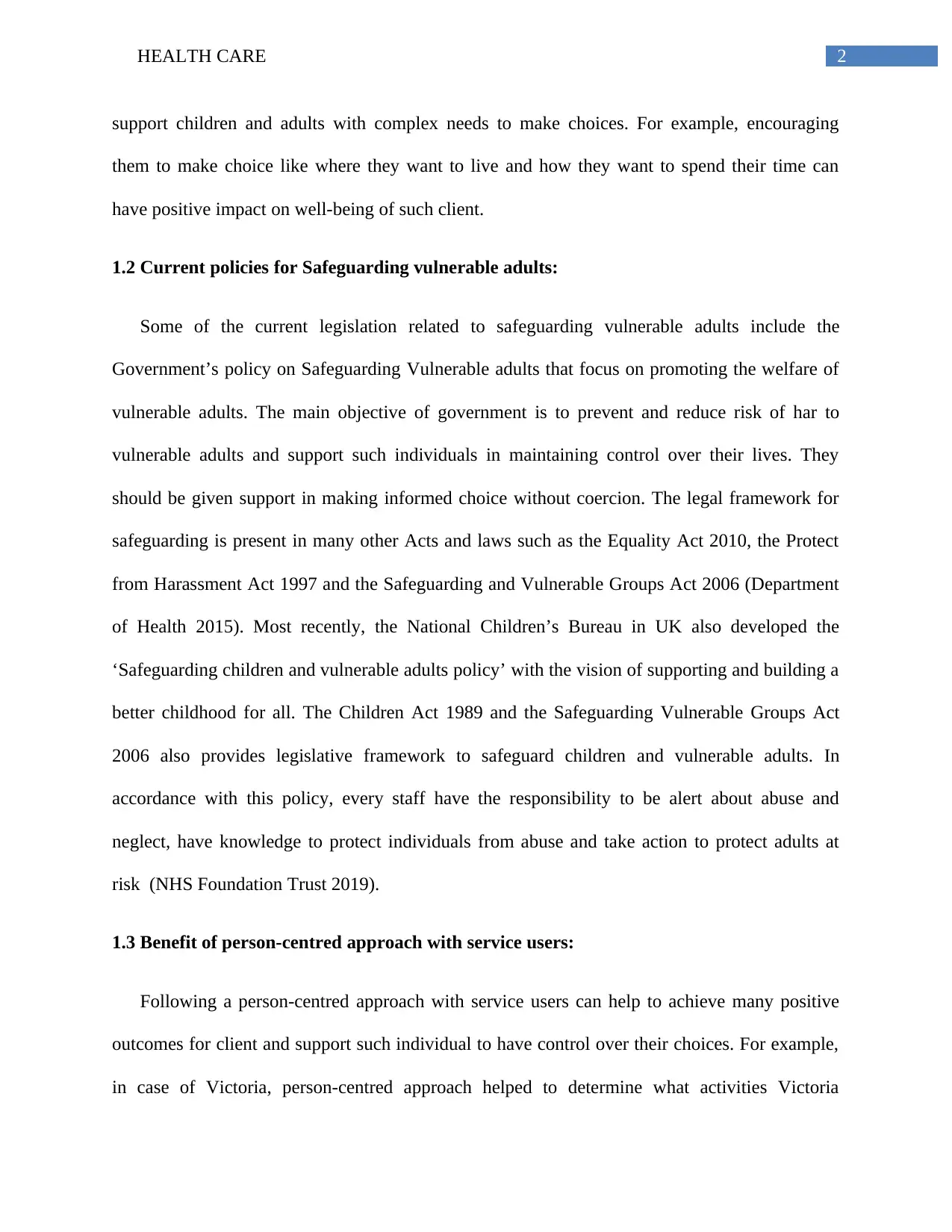
2HEALTH CARE
support children and adults with complex needs to make choices. For example, encouraging
them to make choice like where they want to live and how they want to spend their time can
have positive impact on well-being of such client.
1.2 Current policies for Safeguarding vulnerable adults:
Some of the current legislation related to safeguarding vulnerable adults include the
Government’s policy on Safeguarding Vulnerable adults that focus on promoting the welfare of
vulnerable adults. The main objective of government is to prevent and reduce risk of har to
vulnerable adults and support such individuals in maintaining control over their lives. They
should be given support in making informed choice without coercion. The legal framework for
safeguarding is present in many other Acts and laws such as the Equality Act 2010, the Protect
from Harassment Act 1997 and the Safeguarding and Vulnerable Groups Act 2006 (Department
of Health 2015). Most recently, the National Children’s Bureau in UK also developed the
‘Safeguarding children and vulnerable adults policy’ with the vision of supporting and building a
better childhood for all. The Children Act 1989 and the Safeguarding Vulnerable Groups Act
2006 also provides legislative framework to safeguard children and vulnerable adults. In
accordance with this policy, every staff have the responsibility to be alert about abuse and
neglect, have knowledge to protect individuals from abuse and take action to protect adults at
risk (NHS Foundation Trust 2019).
1.3 Benefit of person-centred approach with service users:
Following a person-centred approach with service users can help to achieve many positive
outcomes for client and support such individual to have control over their choices. For example,
in case of Victoria, person-centred approach helped to determine what activities Victoria
support children and adults with complex needs to make choices. For example, encouraging
them to make choice like where they want to live and how they want to spend their time can
have positive impact on well-being of such client.
1.2 Current policies for Safeguarding vulnerable adults:
Some of the current legislation related to safeguarding vulnerable adults include the
Government’s policy on Safeguarding Vulnerable adults that focus on promoting the welfare of
vulnerable adults. The main objective of government is to prevent and reduce risk of har to
vulnerable adults and support such individuals in maintaining control over their lives. They
should be given support in making informed choice without coercion. The legal framework for
safeguarding is present in many other Acts and laws such as the Equality Act 2010, the Protect
from Harassment Act 1997 and the Safeguarding and Vulnerable Groups Act 2006 (Department
of Health 2015). Most recently, the National Children’s Bureau in UK also developed the
‘Safeguarding children and vulnerable adults policy’ with the vision of supporting and building a
better childhood for all. The Children Act 1989 and the Safeguarding Vulnerable Groups Act
2006 also provides legislative framework to safeguard children and vulnerable adults. In
accordance with this policy, every staff have the responsibility to be alert about abuse and
neglect, have knowledge to protect individuals from abuse and take action to protect adults at
risk (NHS Foundation Trust 2019).
1.3 Benefit of person-centred approach with service users:
Following a person-centred approach with service users can help to achieve many positive
outcomes for client and support such individual to have control over their choices. For example,
in case of Victoria, person-centred approach helped to determine what activities Victoria
⊘ This is a preview!⊘
Do you want full access?
Subscribe today to unlock all pages.

Trusted by 1+ million students worldwide
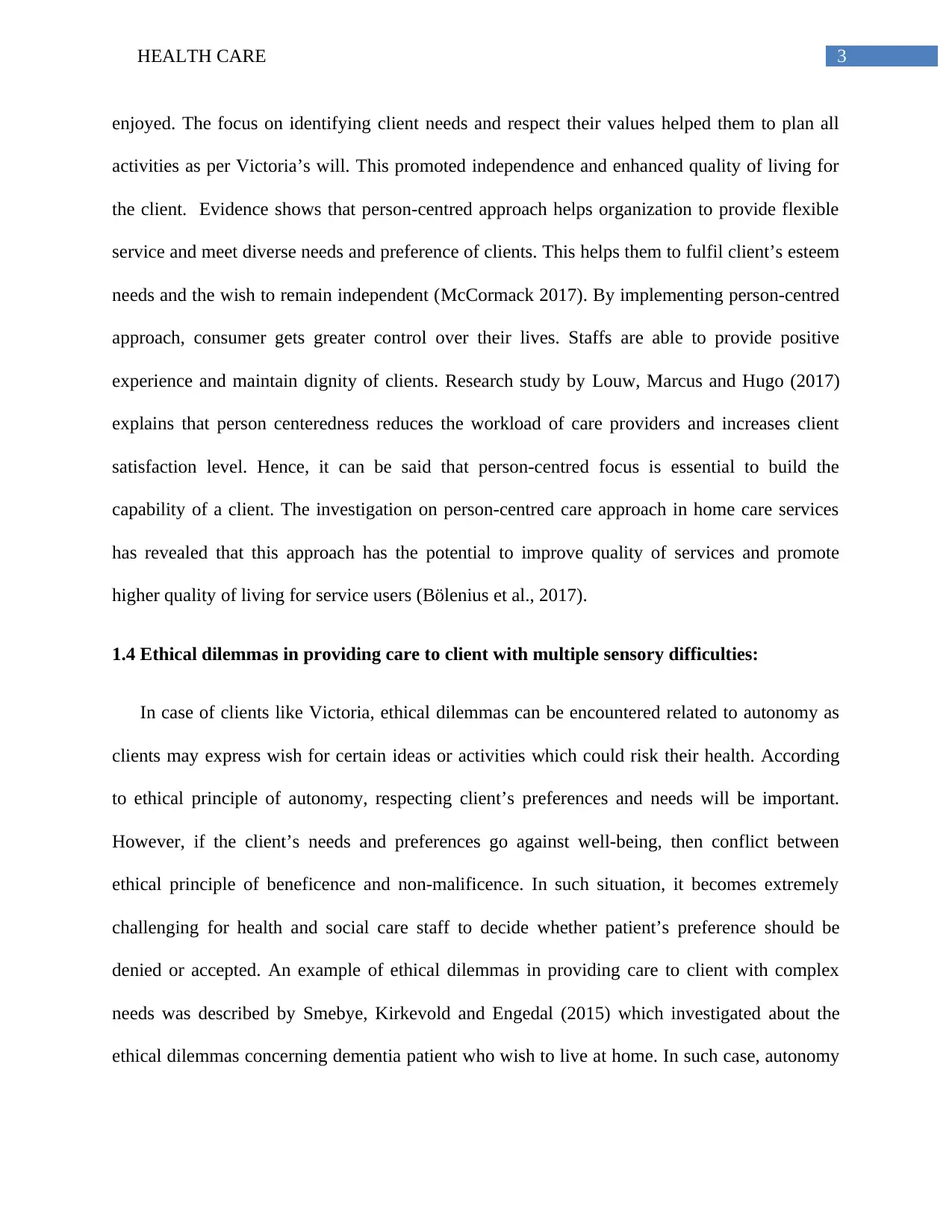
3HEALTH CARE
enjoyed. The focus on identifying client needs and respect their values helped them to plan all
activities as per Victoria’s will. This promoted independence and enhanced quality of living for
the client. Evidence shows that person-centred approach helps organization to provide flexible
service and meet diverse needs and preference of clients. This helps them to fulfil client’s esteem
needs and the wish to remain independent (McCormack 2017). By implementing person-centred
approach, consumer gets greater control over their lives. Staffs are able to provide positive
experience and maintain dignity of clients. Research study by Louw, Marcus and Hugo (2017)
explains that person centeredness reduces the workload of care providers and increases client
satisfaction level. Hence, it can be said that person-centred focus is essential to build the
capability of a client. The investigation on person-centred care approach in home care services
has revealed that this approach has the potential to improve quality of services and promote
higher quality of living for service users (Bölenius et al., 2017).
1.4 Ethical dilemmas in providing care to client with multiple sensory difficulties:
In case of clients like Victoria, ethical dilemmas can be encountered related to autonomy as
clients may express wish for certain ideas or activities which could risk their health. According
to ethical principle of autonomy, respecting client’s preferences and needs will be important.
However, if the client’s needs and preferences go against well-being, then conflict between
ethical principle of beneficence and non-malificence. In such situation, it becomes extremely
challenging for health and social care staff to decide whether patient’s preference should be
denied or accepted. An example of ethical dilemmas in providing care to client with complex
needs was described by Smebye, Kirkevold and Engedal (2015) which investigated about the
ethical dilemmas concerning dementia patient who wish to live at home. In such case, autonomy
enjoyed. The focus on identifying client needs and respect their values helped them to plan all
activities as per Victoria’s will. This promoted independence and enhanced quality of living for
the client. Evidence shows that person-centred approach helps organization to provide flexible
service and meet diverse needs and preference of clients. This helps them to fulfil client’s esteem
needs and the wish to remain independent (McCormack 2017). By implementing person-centred
approach, consumer gets greater control over their lives. Staffs are able to provide positive
experience and maintain dignity of clients. Research study by Louw, Marcus and Hugo (2017)
explains that person centeredness reduces the workload of care providers and increases client
satisfaction level. Hence, it can be said that person-centred focus is essential to build the
capability of a client. The investigation on person-centred care approach in home care services
has revealed that this approach has the potential to improve quality of services and promote
higher quality of living for service users (Bölenius et al., 2017).
1.4 Ethical dilemmas in providing care to client with multiple sensory difficulties:
In case of clients like Victoria, ethical dilemmas can be encountered related to autonomy as
clients may express wish for certain ideas or activities which could risk their health. According
to ethical principle of autonomy, respecting client’s preferences and needs will be important.
However, if the client’s needs and preferences go against well-being, then conflict between
ethical principle of beneficence and non-malificence. In such situation, it becomes extremely
challenging for health and social care staff to decide whether patient’s preference should be
denied or accepted. An example of ethical dilemmas in providing care to client with complex
needs was described by Smebye, Kirkevold and Engedal (2015) which investigated about the
ethical dilemmas concerning dementia patient who wish to live at home. In such case, autonomy
Paraphrase This Document
Need a fresh take? Get an instant paraphrase of this document with our AI Paraphraser

4HEALTH CARE
of client with dementia conflict with professional’s need to prevent any harm to client, autonomy
of the care and the beneficence of the carer.
Task 2
2.1 Five important points on your chosen Code of Practice and reasoning behind it
To complete assessment Part 2, a Code of Conduct has been chosen and the name of this Code of
Conduct is “Code of Conduct for Healthcare Support Workers and Adult Social Care Workers in
England” (Code of Conduct for Healthcare Support Workers and Adult Social Care Workers in
England 2013).
This conduct is very vital and informative to the new social worker in the residential area and
five important aspect of this code of conduct are mentioned below:
1. This Code of Conduct instils the new social workers to be accountable for their actions and
take responsibility of their actions.
2. This Code of Conduct teaches the new social workers to uphold and promote the dignity,
privacy, health, wellbeing, and rights of the individuals who are in need of social and health care
service.
3. This Code of Conduct drills the idea to new social workers to promote and endorses the idea
of collaboration with team mates in order to provide safe, high quality and empathetic support
and health care.
4. This Code of Conduct teaches the new social worker to continually strive to enhance their
health care quality and support by the process of continuous professional development.
of client with dementia conflict with professional’s need to prevent any harm to client, autonomy
of the care and the beneficence of the carer.
Task 2
2.1 Five important points on your chosen Code of Practice and reasoning behind it
To complete assessment Part 2, a Code of Conduct has been chosen and the name of this Code of
Conduct is “Code of Conduct for Healthcare Support Workers and Adult Social Care Workers in
England” (Code of Conduct for Healthcare Support Workers and Adult Social Care Workers in
England 2013).
This conduct is very vital and informative to the new social worker in the residential area and
five important aspect of this code of conduct are mentioned below:
1. This Code of Conduct instils the new social workers to be accountable for their actions and
take responsibility of their actions.
2. This Code of Conduct teaches the new social workers to uphold and promote the dignity,
privacy, health, wellbeing, and rights of the individuals who are in need of social and health care
service.
3. This Code of Conduct drills the idea to new social workers to promote and endorses the idea
of collaboration with team mates in order to provide safe, high quality and empathetic support
and health care.
4. This Code of Conduct teaches the new social worker to continually strive to enhance their
health care quality and support by the process of continuous professional development.
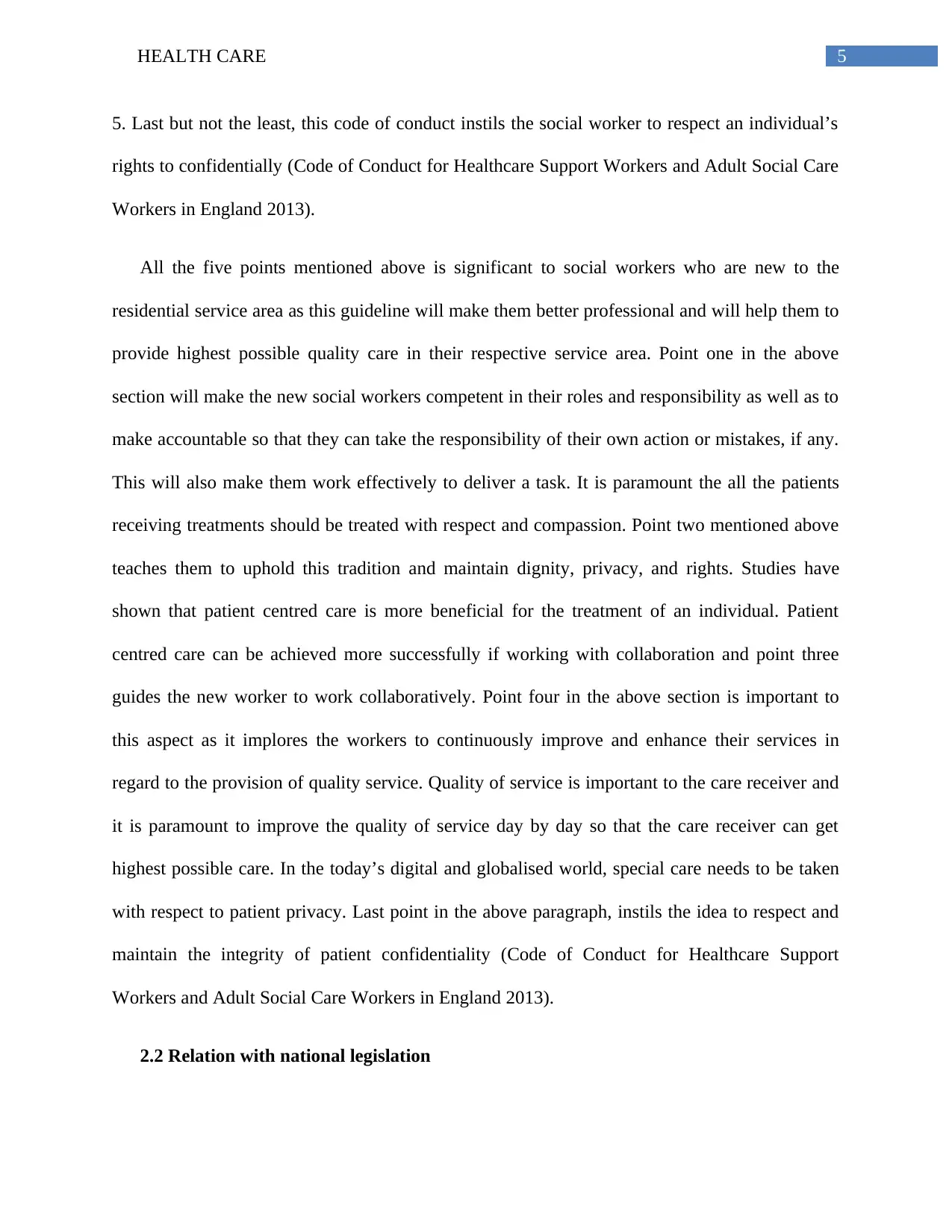
5HEALTH CARE
5. Last but not the least, this code of conduct instils the social worker to respect an individual’s
rights to confidentially (Code of Conduct for Healthcare Support Workers and Adult Social Care
Workers in England 2013).
All the five points mentioned above is significant to social workers who are new to the
residential service area as this guideline will make them better professional and will help them to
provide highest possible quality care in their respective service area. Point one in the above
section will make the new social workers competent in their roles and responsibility as well as to
make accountable so that they can take the responsibility of their own action or mistakes, if any.
This will also make them work effectively to deliver a task. It is paramount the all the patients
receiving treatments should be treated with respect and compassion. Point two mentioned above
teaches them to uphold this tradition and maintain dignity, privacy, and rights. Studies have
shown that patient centred care is more beneficial for the treatment of an individual. Patient
centred care can be achieved more successfully if working with collaboration and point three
guides the new worker to work collaboratively. Point four in the above section is important to
this aspect as it implores the workers to continuously improve and enhance their services in
regard to the provision of quality service. Quality of service is important to the care receiver and
it is paramount to improve the quality of service day by day so that the care receiver can get
highest possible care. In the today’s digital and globalised world, special care needs to be taken
with respect to patient privacy. Last point in the above paragraph, instils the idea to respect and
maintain the integrity of patient confidentiality (Code of Conduct for Healthcare Support
Workers and Adult Social Care Workers in England 2013).
2.2 Relation with national legislation
5. Last but not the least, this code of conduct instils the social worker to respect an individual’s
rights to confidentially (Code of Conduct for Healthcare Support Workers and Adult Social Care
Workers in England 2013).
All the five points mentioned above is significant to social workers who are new to the
residential service area as this guideline will make them better professional and will help them to
provide highest possible quality care in their respective service area. Point one in the above
section will make the new social workers competent in their roles and responsibility as well as to
make accountable so that they can take the responsibility of their own action or mistakes, if any.
This will also make them work effectively to deliver a task. It is paramount the all the patients
receiving treatments should be treated with respect and compassion. Point two mentioned above
teaches them to uphold this tradition and maintain dignity, privacy, and rights. Studies have
shown that patient centred care is more beneficial for the treatment of an individual. Patient
centred care can be achieved more successfully if working with collaboration and point three
guides the new worker to work collaboratively. Point four in the above section is important to
this aspect as it implores the workers to continuously improve and enhance their services in
regard to the provision of quality service. Quality of service is important to the care receiver and
it is paramount to improve the quality of service day by day so that the care receiver can get
highest possible care. In the today’s digital and globalised world, special care needs to be taken
with respect to patient privacy. Last point in the above paragraph, instils the idea to respect and
maintain the integrity of patient confidentiality (Code of Conduct for Healthcare Support
Workers and Adult Social Care Workers in England 2013).
2.2 Relation with national legislation
⊘ This is a preview!⊘
Do you want full access?
Subscribe today to unlock all pages.

Trusted by 1+ million students worldwide
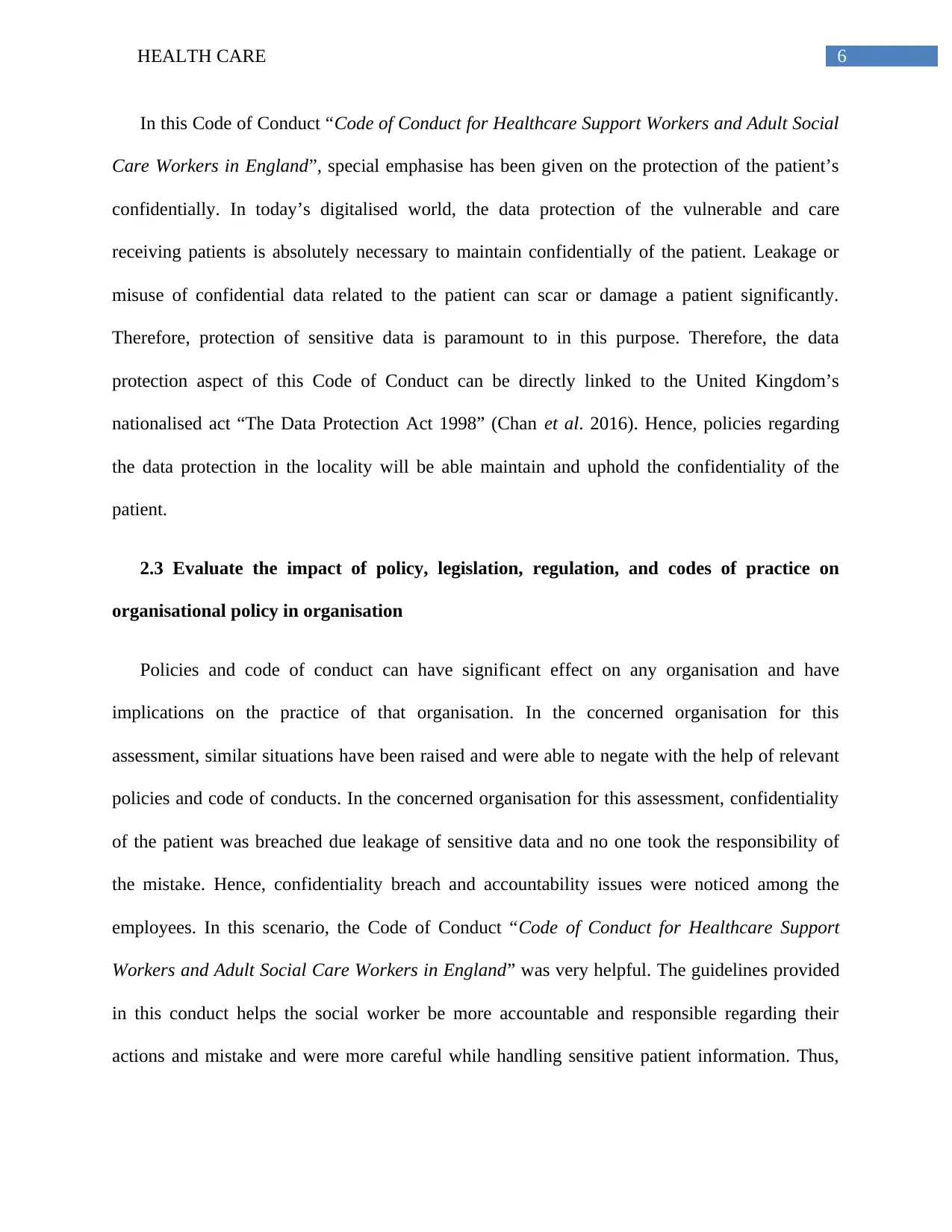
6HEALTH CARE
In this Code of Conduct “Code of Conduct for Healthcare Support Workers and Adult Social
Care Workers in England”, special emphasise has been given on the protection of the patient’s
confidentially. In today’s digitalised world, the data protection of the vulnerable and care
receiving patients is absolutely necessary to maintain confidentially of the patient. Leakage or
misuse of confidential data related to the patient can scar or damage a patient significantly.
Therefore, protection of sensitive data is paramount to in this purpose. Therefore, the data
protection aspect of this Code of Conduct can be directly linked to the United Kingdom’s
nationalised act “The Data Protection Act 1998” (Chan et al. 2016). Hence, policies regarding
the data protection in the locality will be able maintain and uphold the confidentiality of the
patient.
2.3 Evaluate the impact of policy, legislation, regulation, and codes of practice on
organisational policy in organisation
Policies and code of conduct can have significant effect on any organisation and have
implications on the practice of that organisation. In the concerned organisation for this
assessment, similar situations have been raised and were able to negate with the help of relevant
policies and code of conducts. In the concerned organisation for this assessment, confidentiality
of the patient was breached due leakage of sensitive data and no one took the responsibility of
the mistake. Hence, confidentiality breach and accountability issues were noticed among the
employees. In this scenario, the Code of Conduct “Code of Conduct for Healthcare Support
Workers and Adult Social Care Workers in England” was very helpful. The guidelines provided
in this conduct helps the social worker be more accountable and responsible regarding their
actions and mistake and were more careful while handling sensitive patient information. Thus,
In this Code of Conduct “Code of Conduct for Healthcare Support Workers and Adult Social
Care Workers in England”, special emphasise has been given on the protection of the patient’s
confidentially. In today’s digitalised world, the data protection of the vulnerable and care
receiving patients is absolutely necessary to maintain confidentially of the patient. Leakage or
misuse of confidential data related to the patient can scar or damage a patient significantly.
Therefore, protection of sensitive data is paramount to in this purpose. Therefore, the data
protection aspect of this Code of Conduct can be directly linked to the United Kingdom’s
nationalised act “The Data Protection Act 1998” (Chan et al. 2016). Hence, policies regarding
the data protection in the locality will be able maintain and uphold the confidentiality of the
patient.
2.3 Evaluate the impact of policy, legislation, regulation, and codes of practice on
organisational policy in organisation
Policies and code of conduct can have significant effect on any organisation and have
implications on the practice of that organisation. In the concerned organisation for this
assessment, similar situations have been raised and were able to negate with the help of relevant
policies and code of conducts. In the concerned organisation for this assessment, confidentiality
of the patient was breached due leakage of sensitive data and no one took the responsibility of
the mistake. Hence, confidentiality breach and accountability issues were noticed among the
employees. In this scenario, the Code of Conduct “Code of Conduct for Healthcare Support
Workers and Adult Social Care Workers in England” was very helpful. The guidelines provided
in this conduct helps the social worker be more accountable and responsible regarding their
actions and mistake and were more careful while handling sensitive patient information. Thus,
Paraphrase This Document
Need a fresh take? Get an instant paraphrase of this document with our AI Paraphraser
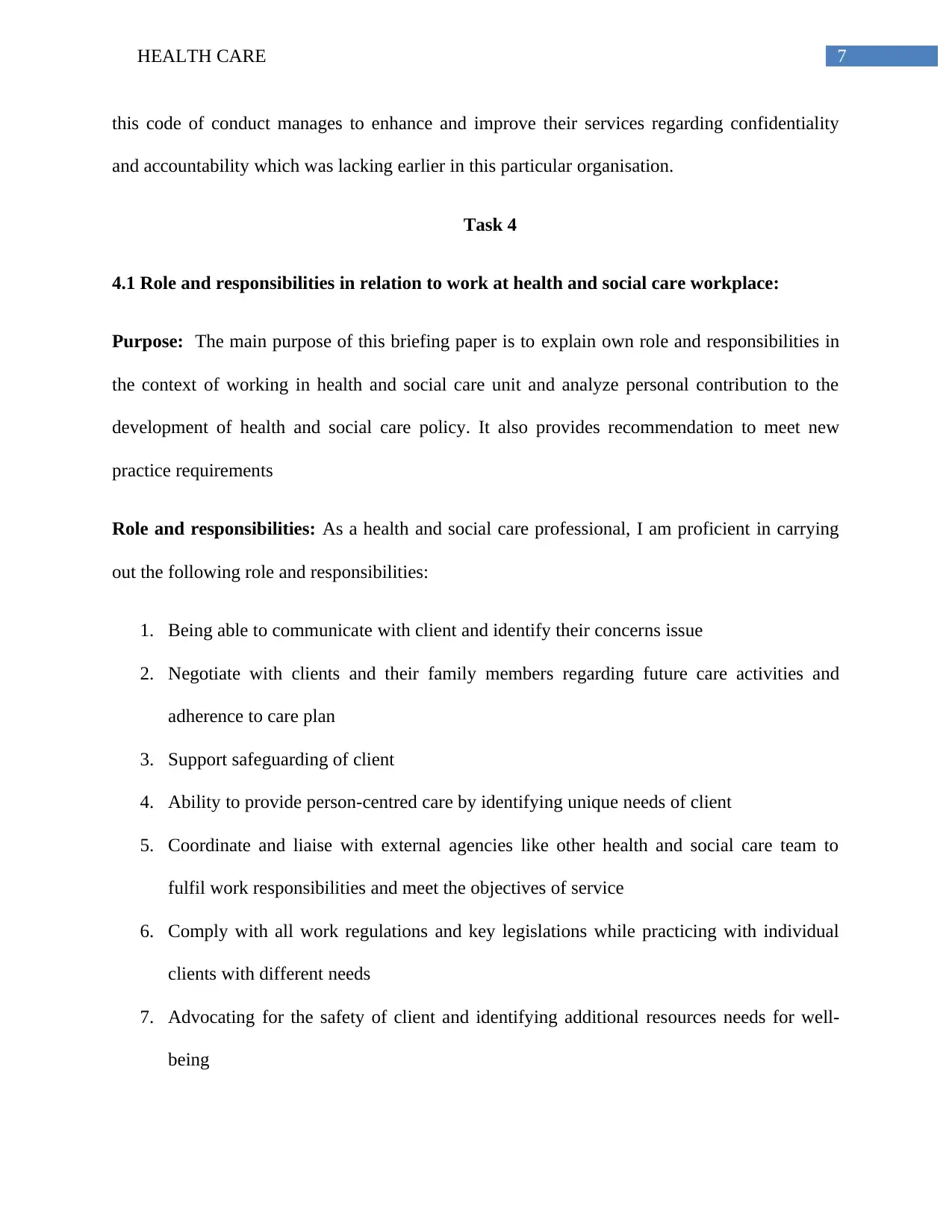
7HEALTH CARE
this code of conduct manages to enhance and improve their services regarding confidentiality
and accountability which was lacking earlier in this particular organisation.
Task 4
4.1 Role and responsibilities in relation to work at health and social care workplace:
Purpose: The main purpose of this briefing paper is to explain own role and responsibilities in
the context of working in health and social care unit and analyze personal contribution to the
development of health and social care policy. It also provides recommendation to meet new
practice requirements
Role and responsibilities: As a health and social care professional, I am proficient in carrying
out the following role and responsibilities:
1. Being able to communicate with client and identify their concerns issue
2. Negotiate with clients and their family members regarding future care activities and
adherence to care plan
3. Support safeguarding of client
4. Ability to provide person-centred care by identifying unique needs of client
5. Coordinate and liaise with external agencies like other health and social care team to
fulfil work responsibilities and meet the objectives of service
6. Comply with all work regulations and key legislations while practicing with individual
clients with different needs
7. Advocating for the safety of client and identifying additional resources needs for well-
being
this code of conduct manages to enhance and improve their services regarding confidentiality
and accountability which was lacking earlier in this particular organisation.
Task 4
4.1 Role and responsibilities in relation to work at health and social care workplace:
Purpose: The main purpose of this briefing paper is to explain own role and responsibilities in
the context of working in health and social care unit and analyze personal contribution to the
development of health and social care policy. It also provides recommendation to meet new
practice requirements
Role and responsibilities: As a health and social care professional, I am proficient in carrying
out the following role and responsibilities:
1. Being able to communicate with client and identify their concerns issue
2. Negotiate with clients and their family members regarding future care activities and
adherence to care plan
3. Support safeguarding of client
4. Ability to provide person-centred care by identifying unique needs of client
5. Coordinate and liaise with external agencies like other health and social care team to
fulfil work responsibilities and meet the objectives of service
6. Comply with all work regulations and key legislations while practicing with individual
clients with different needs
7. Advocating for the safety of client and identifying additional resources needs for well-
being
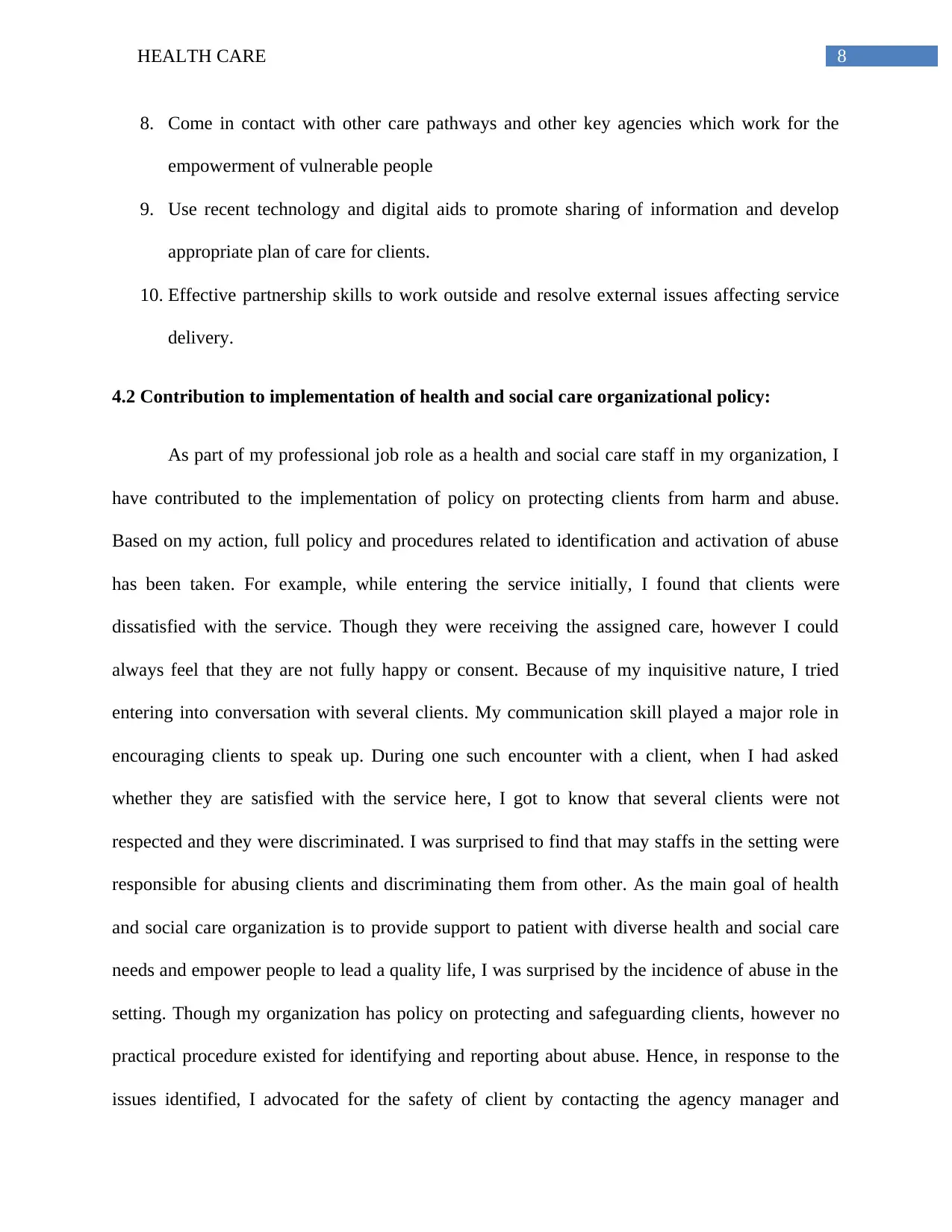
8HEALTH CARE
8. Come in contact with other care pathways and other key agencies which work for the
empowerment of vulnerable people
9. Use recent technology and digital aids to promote sharing of information and develop
appropriate plan of care for clients.
10. Effective partnership skills to work outside and resolve external issues affecting service
delivery.
4.2 Contribution to implementation of health and social care organizational policy:
As part of my professional job role as a health and social care staff in my organization, I
have contributed to the implementation of policy on protecting clients from harm and abuse.
Based on my action, full policy and procedures related to identification and activation of abuse
has been taken. For example, while entering the service initially, I found that clients were
dissatisfied with the service. Though they were receiving the assigned care, however I could
always feel that they are not fully happy or consent. Because of my inquisitive nature, I tried
entering into conversation with several clients. My communication skill played a major role in
encouraging clients to speak up. During one such encounter with a client, when I had asked
whether they are satisfied with the service here, I got to know that several clients were not
respected and they were discriminated. I was surprised to find that may staffs in the setting were
responsible for abusing clients and discriminating them from other. As the main goal of health
and social care organization is to provide support to patient with diverse health and social care
needs and empower people to lead a quality life, I was surprised by the incidence of abuse in the
setting. Though my organization has policy on protecting and safeguarding clients, however no
practical procedure existed for identifying and reporting about abuse. Hence, in response to the
issues identified, I advocated for the safety of client by contacting the agency manager and
8. Come in contact with other care pathways and other key agencies which work for the
empowerment of vulnerable people
9. Use recent technology and digital aids to promote sharing of information and develop
appropriate plan of care for clients.
10. Effective partnership skills to work outside and resolve external issues affecting service
delivery.
4.2 Contribution to implementation of health and social care organizational policy:
As part of my professional job role as a health and social care staff in my organization, I
have contributed to the implementation of policy on protecting clients from harm and abuse.
Based on my action, full policy and procedures related to identification and activation of abuse
has been taken. For example, while entering the service initially, I found that clients were
dissatisfied with the service. Though they were receiving the assigned care, however I could
always feel that they are not fully happy or consent. Because of my inquisitive nature, I tried
entering into conversation with several clients. My communication skill played a major role in
encouraging clients to speak up. During one such encounter with a client, when I had asked
whether they are satisfied with the service here, I got to know that several clients were not
respected and they were discriminated. I was surprised to find that may staffs in the setting were
responsible for abusing clients and discriminating them from other. As the main goal of health
and social care organization is to provide support to patient with diverse health and social care
needs and empower people to lead a quality life, I was surprised by the incidence of abuse in the
setting. Though my organization has policy on protecting and safeguarding clients, however no
practical procedure existed for identifying and reporting about abuse. Hence, in response to the
issues identified, I advocated for the safety of client by contacting the agency manager and
⊘ This is a preview!⊘
Do you want full access?
Subscribe today to unlock all pages.

Trusted by 1+ million students worldwide
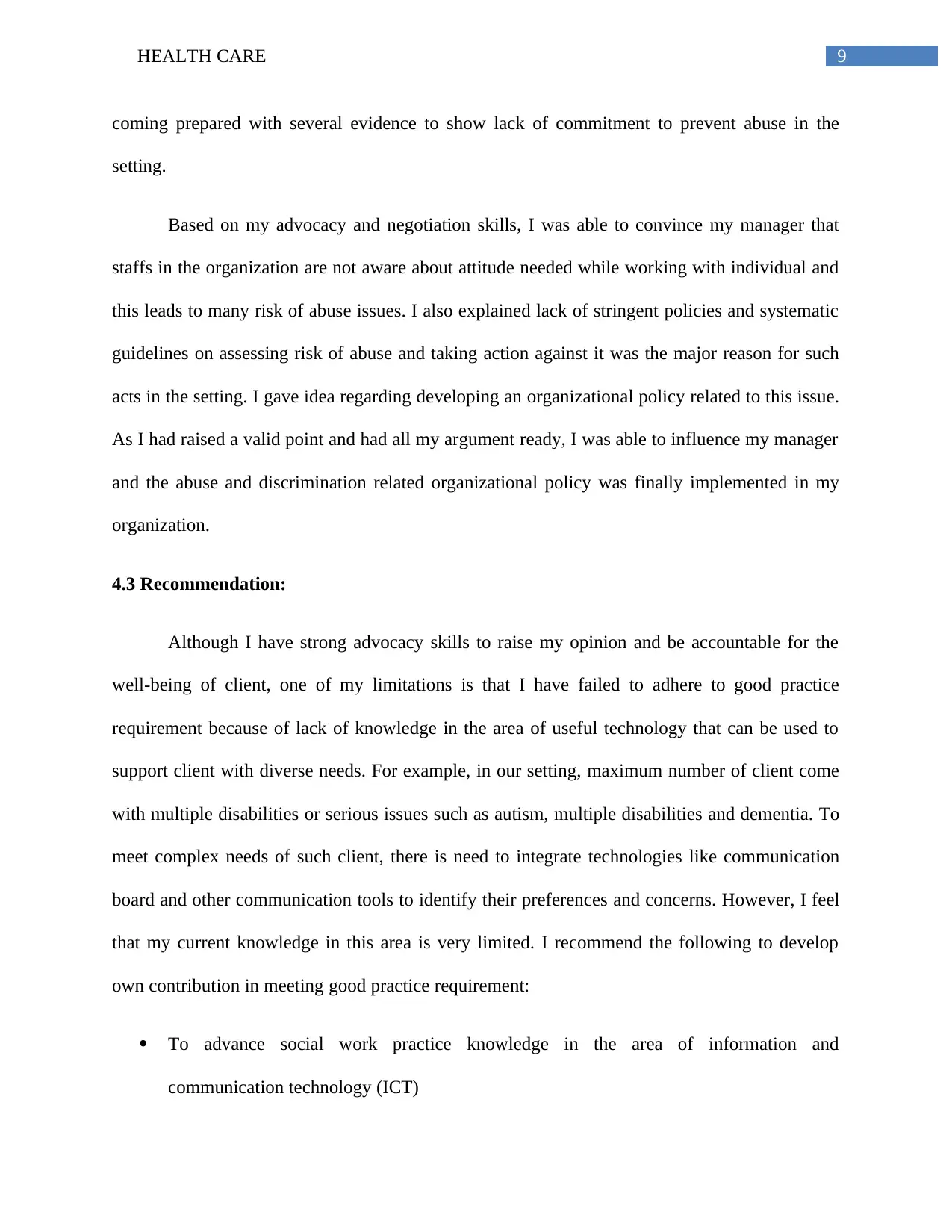
9HEALTH CARE
coming prepared with several evidence to show lack of commitment to prevent abuse in the
setting.
Based on my advocacy and negotiation skills, I was able to convince my manager that
staffs in the organization are not aware about attitude needed while working with individual and
this leads to many risk of abuse issues. I also explained lack of stringent policies and systematic
guidelines on assessing risk of abuse and taking action against it was the major reason for such
acts in the setting. I gave idea regarding developing an organizational policy related to this issue.
As I had raised a valid point and had all my argument ready, I was able to influence my manager
and the abuse and discrimination related organizational policy was finally implemented in my
organization.
4.3 Recommendation:
Although I have strong advocacy skills to raise my opinion and be accountable for the
well-being of client, one of my limitations is that I have failed to adhere to good practice
requirement because of lack of knowledge in the area of useful technology that can be used to
support client with diverse needs. For example, in our setting, maximum number of client come
with multiple disabilities or serious issues such as autism, multiple disabilities and dementia. To
meet complex needs of such client, there is need to integrate technologies like communication
board and other communication tools to identify their preferences and concerns. However, I feel
that my current knowledge in this area is very limited. I recommend the following to develop
own contribution in meeting good practice requirement:
To advance social work practice knowledge in the area of information and
communication technology (ICT)
coming prepared with several evidence to show lack of commitment to prevent abuse in the
setting.
Based on my advocacy and negotiation skills, I was able to convince my manager that
staffs in the organization are not aware about attitude needed while working with individual and
this leads to many risk of abuse issues. I also explained lack of stringent policies and systematic
guidelines on assessing risk of abuse and taking action against it was the major reason for such
acts in the setting. I gave idea regarding developing an organizational policy related to this issue.
As I had raised a valid point and had all my argument ready, I was able to influence my manager
and the abuse and discrimination related organizational policy was finally implemented in my
organization.
4.3 Recommendation:
Although I have strong advocacy skills to raise my opinion and be accountable for the
well-being of client, one of my limitations is that I have failed to adhere to good practice
requirement because of lack of knowledge in the area of useful technology that can be used to
support client with diverse needs. For example, in our setting, maximum number of client come
with multiple disabilities or serious issues such as autism, multiple disabilities and dementia. To
meet complex needs of such client, there is need to integrate technologies like communication
board and other communication tools to identify their preferences and concerns. However, I feel
that my current knowledge in this area is very limited. I recommend the following to develop
own contribution in meeting good practice requirement:
To advance social work practice knowledge in the area of information and
communication technology (ICT)
Paraphrase This Document
Need a fresh take? Get an instant paraphrase of this document with our AI Paraphraser

10HEALTH CARE
To learn skills related to adoption and identification of relevant ICT resource for
individual client.
To learn skills related to adoption and identification of relevant ICT resource for
individual client.
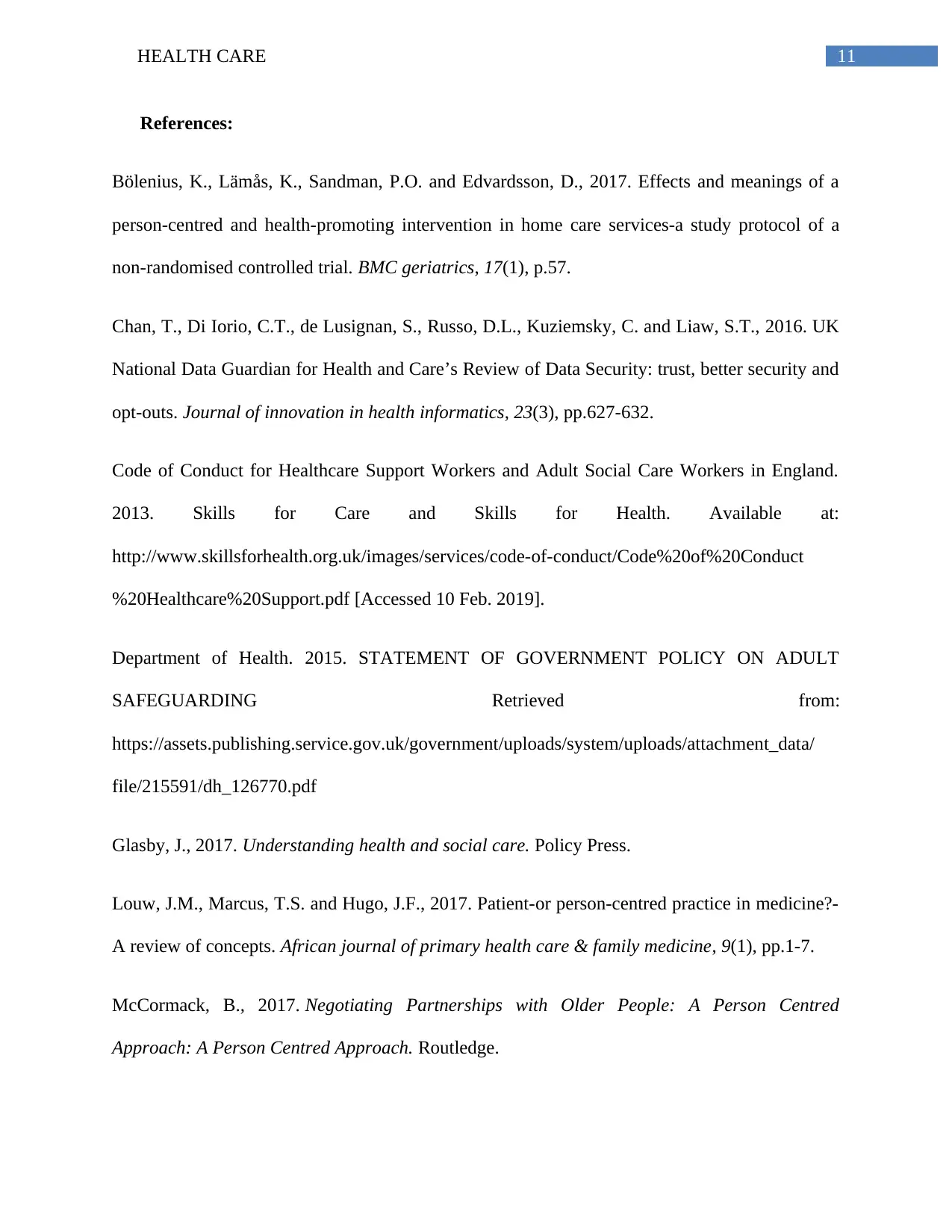
11HEALTH CARE
References:
Bölenius, K., Lämås, K., Sandman, P.O. and Edvardsson, D., 2017. Effects and meanings of a
person-centred and health-promoting intervention in home care services-a study protocol of a
non-randomised controlled trial. BMC geriatrics, 17(1), p.57.
Chan, T., Di Iorio, C.T., de Lusignan, S., Russo, D.L., Kuziemsky, C. and Liaw, S.T., 2016. UK
National Data Guardian for Health and Care’s Review of Data Security: trust, better security and
opt-outs. Journal of innovation in health informatics, 23(3), pp.627-632.
Code of Conduct for Healthcare Support Workers and Adult Social Care Workers in England.
2013. Skills for Care and Skills for Health. Available at:
http://www.skillsforhealth.org.uk/images/services/code-of-conduct/Code%20of%20Conduct
%20Healthcare%20Support.pdf [Accessed 10 Feb. 2019].
Department of Health. 2015. STATEMENT OF GOVERNMENT POLICY ON ADULT
SAFEGUARDING Retrieved from:
https://assets.publishing.service.gov.uk/government/uploads/system/uploads/attachment_data/
file/215591/dh_126770.pdf
Glasby, J., 2017. Understanding health and social care. Policy Press.
Louw, J.M., Marcus, T.S. and Hugo, J.F., 2017. Patient-or person-centred practice in medicine?-
A review of concepts. African journal of primary health care & family medicine, 9(1), pp.1-7.
McCormack, B., 2017. Negotiating Partnerships with Older People: A Person Centred
Approach: A Person Centred Approach. Routledge.
References:
Bölenius, K., Lämås, K., Sandman, P.O. and Edvardsson, D., 2017. Effects and meanings of a
person-centred and health-promoting intervention in home care services-a study protocol of a
non-randomised controlled trial. BMC geriatrics, 17(1), p.57.
Chan, T., Di Iorio, C.T., de Lusignan, S., Russo, D.L., Kuziemsky, C. and Liaw, S.T., 2016. UK
National Data Guardian for Health and Care’s Review of Data Security: trust, better security and
opt-outs. Journal of innovation in health informatics, 23(3), pp.627-632.
Code of Conduct for Healthcare Support Workers and Adult Social Care Workers in England.
2013. Skills for Care and Skills for Health. Available at:
http://www.skillsforhealth.org.uk/images/services/code-of-conduct/Code%20of%20Conduct
%20Healthcare%20Support.pdf [Accessed 10 Feb. 2019].
Department of Health. 2015. STATEMENT OF GOVERNMENT POLICY ON ADULT
SAFEGUARDING Retrieved from:
https://assets.publishing.service.gov.uk/government/uploads/system/uploads/attachment_data/
file/215591/dh_126770.pdf
Glasby, J., 2017. Understanding health and social care. Policy Press.
Louw, J.M., Marcus, T.S. and Hugo, J.F., 2017. Patient-or person-centred practice in medicine?-
A review of concepts. African journal of primary health care & family medicine, 9(1), pp.1-7.
McCormack, B., 2017. Negotiating Partnerships with Older People: A Person Centred
Approach: A Person Centred Approach. Routledge.
⊘ This is a preview!⊘
Do you want full access?
Subscribe today to unlock all pages.

Trusted by 1+ million students worldwide
1 out of 13
Related Documents
Your All-in-One AI-Powered Toolkit for Academic Success.
+13062052269
info@desklib.com
Available 24*7 on WhatsApp / Email
![[object Object]](/_next/static/media/star-bottom.7253800d.svg)
Unlock your academic potential
Copyright © 2020–2026 A2Z Services. All Rights Reserved. Developed and managed by ZUCOL.



